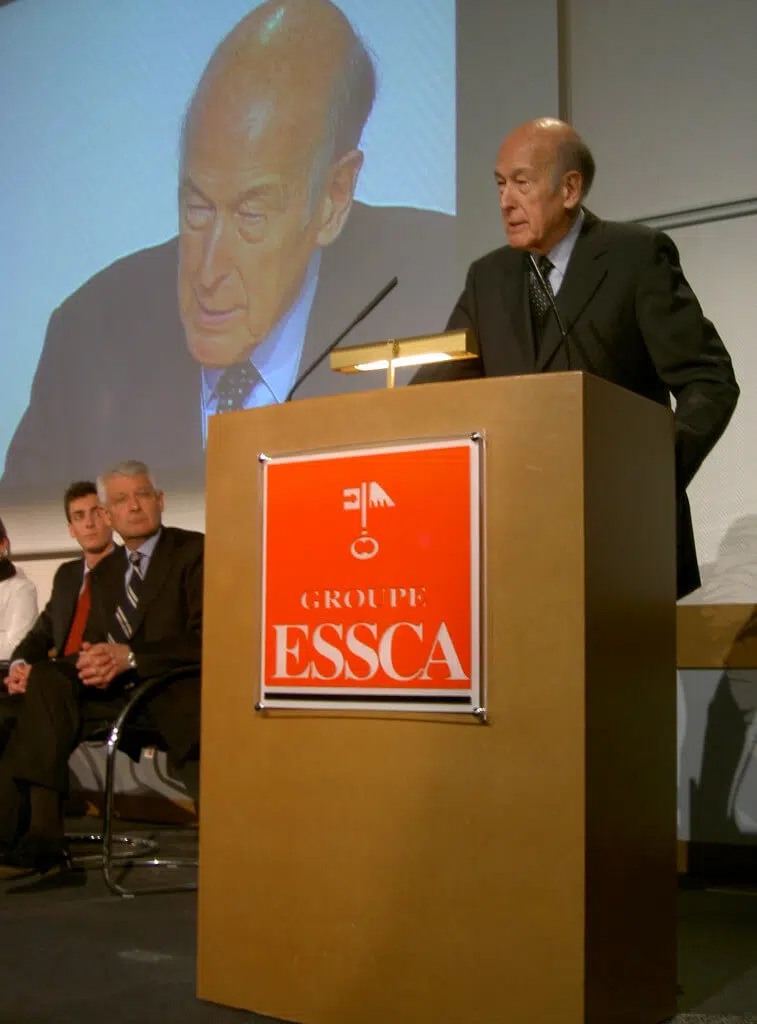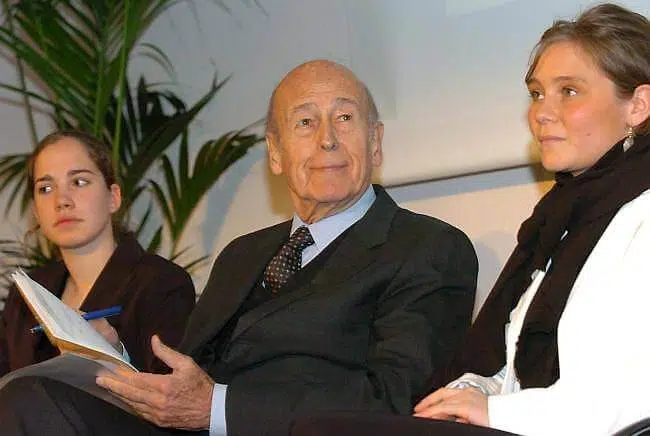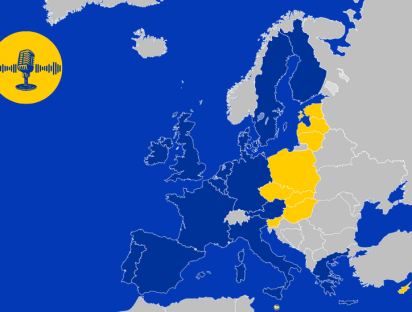14 April 2005. An overcrowded Amphi Gounouf at ESSCA’s Angers campus requires the opening of another classroom for a live video broadcast. The reason for this scrum at ESSCA is the visit of the former President of the Republic, Valéry Giscard d’Estaing, who has come to give a speech on Europe followed by an exchange with a handful of students.  But this is not only an elder statesman addressing a lecture hall filled with students an guests, but at the same a salesman doing the after-sales service for a product that he has strongly contributed to mould himself.
But this is not only an elder statesman addressing a lecture hall filled with students an guests, but at the same a salesman doing the after-sales service for a product that he has strongly contributed to mould himself.
The purpose of the visit
Between March 2002 and June 2003, he had chaired the meetings of the European Convention, which had been set up to reflect about the future of a Union of 15 member states that was to count 25 or 30 any time soon, and to elaborate a “Constitution” based on the existing treaties. If Giscard visited ESSCA in spring 2005, it was to defend a text which was to be submitted to a referendum in only a few weeks, on 29 May. In retrospective, the result of this ratification referendum – a smashing defeat with 55% voting “NON” – quickly overshadowed the fact that the “Convention” itself had been a real success. On a personal note, I had been rather impressed with the setting up of this by definition temporary institution, by the quality of the contributions, and the transparency, with which the debates could be followed on the web. In July 2003, when Giscard was solemnly handing over the final text to the European Council, I was in Brussels with the students of the Angers Summer Programme, and we were surprised with the positive and optimistic atmosphere everywhere we went (and which was quite a change to the usual frustration with the Union’s shortcomings). It was widely recognised – with the exception, of course, of the British tabloids – that Valéry Giscard d’Estaing had managed this quite special convention with all his diplomatic know-how, with gravitas and humour, and in full command of the details. He was therefore well place to explain the treaty to the citizens.
 The evening at ESSCA
The evening at ESSCA
Back in amphi Gounouf. The former president of the Republic was visible delighted to find himself with a handful of young students who, in turn, were visibly very impressed with the charism of the 79-years-old elder statesman. After a bit of coquetry on his age, he staunchly defended his text, hiding his disappointment with the manner in which the substance of the original treaty had been watered down by the European Councils in 2003 and 2004. Rather helplessly, he had witnessed how the “big” member-states wanted to modify the voting rights, how the “small” member-states were all up in arms about “their” commissioner, how the catholic member-states insisted on a reference to the Christian heritage of Europe, and how Poland, Spain and the UK went each on a major ego-trip. All that remained of the rather audacious “Constitution” of the summer of 2003 was a much diluted and quite indigestible treaty of close to 500 pages, unreadable for every citizen who did not have the good luck to have doctorate in international law. Anything but the succinct, fundamental text initially hoped for. Giscard was disgusted, but undaunted, and completed his after-sales service with some fake enthusiasm, singing the praise of what he called his “child’. He even went so far as to find this pseudo-constitution “as perfect as the French constitution”. A comparison, which in retrospect sounds like a Freudian slip of the tongue, given the defaults of both texts. He also made one important error. He fell into the trap of assimilating any criticism of the treaty, however well-founded and differentiated it may have been, to the old anti-European reflexes of the political extremes. A very regrettable attitude, which is perceived by many, not without justification, as yet another evidence of élitist condescension if not contempt. Needless to say, among the students of ESSCA, Giscard was preaching to the converted. Our students are smart, young, multilingual individuals, with high-level academic training and an international mindset – in other words: the prototypes of those Europeans for whom Europe (just like globalisation) does not stand for economic threat and identity angst, but for professional opportunity and cultural diversity. Clearly, the public at ESSCA this evening was not representative of the electorate of 29 May.
That same evening, in the Elysée
On the very same evening, Jacques Chirac, French president for ten years already, convened a panel of 83 young citizens between 18 and 30 years old to the Elysée Palace in order to debate on Europe. It was live on TF1, and it was a disaster.Visibly, the President – whose European policies hardly had any credibility, being based on opportunism rather than conviction – had not expected to face the fears and the scepticism his audience gave evidence of throughout the discussion. The sentence that more than any other gave evidence to his flagrant inability to understand the prevailing doubts was his avowal of total lack of understanding of the young people’s ‘pessimism’ with regard to France and Europe: ‘Je ne le comprends pas!’, he sighed, incredulously and helplessly messing up a communication exercise that had seemed so simple and had turned so sour. Each in its own way, the two high-level events at ESSCA and at the Elysée, showcased the huge chasm that had opened, most notably on the European question, between the French élites and a large part of the population, seized by a perfectly legitimate doubt on the manner in which the European Union was being built. Six weeks later, the constitutional treaty was voted into the dustbin of history.
The legacy of spring 2005
Fifteen years later, the episode of 14 April 2005 remains emblematic of the socio-economic rift that has been deepening in French society since the debate on the Maastricht Treaty in 1992. Of course, the French “No” vote of 2005 had multiple causes (as shown by numerous publications like the Jean Jaurès Foundation’s remarkable analysis entitled « Le jour où la France a dit Non »), but Europe remains an issue that seems to crystallise opposing attitudes towards the steamroller of the globalisation process and its fuel, capitalism. But the 2005 referendum has left other traces. The bitterness of the day’s winners, for instance. They had to realise that their vote did not provoke any revolution within the European Union, neither in its politics (still focused in priority on the smallest common denominator, the Single Market), not in its functioing, as evidenced by the Lisbon Treaty, in effect since 2011. But the campaign of 2005 has also revealed that the period that European Studies refer to as “permissive consensus”, had definitely come to an end. The four post-war decades had been characteristed by trust and a certein “permission slip” given by citizens to their political élites for anything related to European integration. Since the end of the 20th century, this “permission” is nul and void. European politics have become politicised, the trust has vanished, polarisation has been consolidated. Finally, the spring of 2005 also reminded everybody (or should have done so) that the referendum is a tool of direct democracy that should be consumed responsibly. It is not by chance that a state like the Federal Republic of Germany, facing the lessons of its nation’s history, preferred to prohibit it in its constitution of 1949. Whatever one’s opinion about this kind of popular vote, it is not exaggerated to claim that the French referendum of 2005 did not produce any winner.

 The evening at ESSCA
The evening at ESSCA


